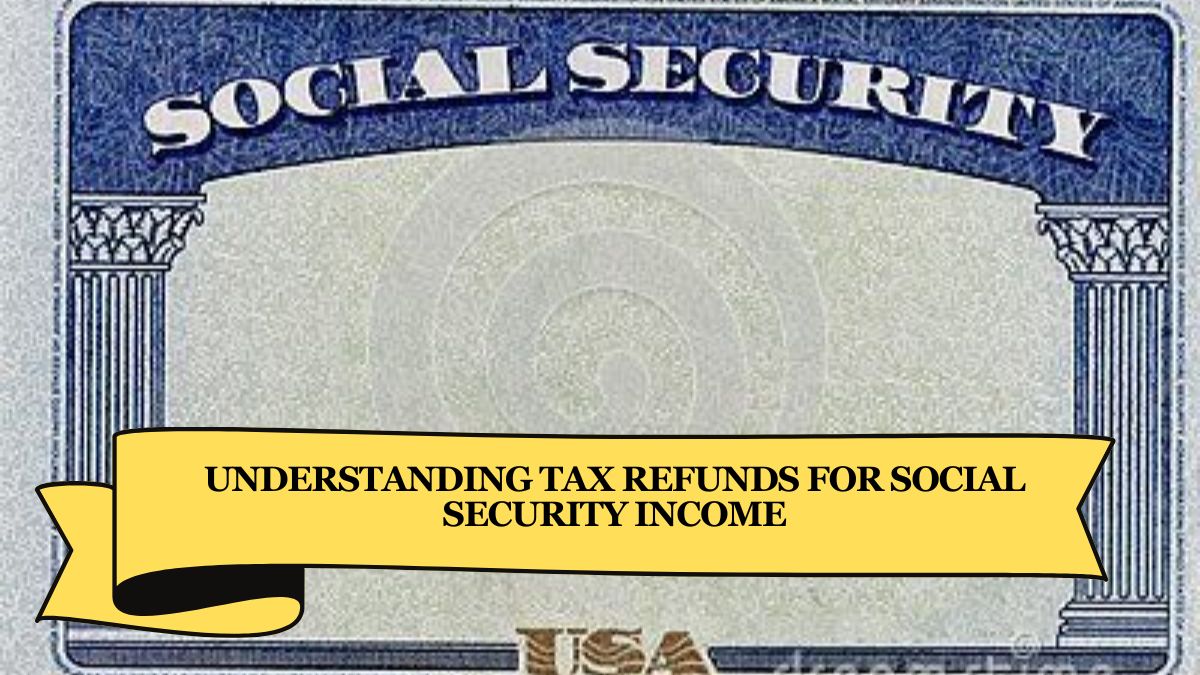If you’re someone who only gets Social Security income, you may be wondering if you’re eligible for a tax refund. Usually, people expect a refund when they’ve paid too much in taxes. This happens when your employer withholds more taxes than needed from your paycheck. However, the situation is a bit more complicated when your only source of income is Social Security benefits. This guide will help you understand how tax refunds work for Social Security recipients and what factors could influence whether you’ll get a refund.
Social Security and Taxes: What You Need to Know
In the United States, Social Security benefits are considered taxable for federal tax purposes, but the amount that is taxed depends on your total income. Social Security benefits include monthly payments to retired or disabled individuals to help replace a portion of their income. How much you get is determined by your lifetime earnings and the age at which you begin receiving benefits.
If you only have Social Security income, your taxes are handled differently compared to someone with regular employment income. The good news is that in some states, like Texas, Social Security benefits are not taxed at the state level. This means if you live in Texas, your Social Security income will not be taxed by the state, which simplifies your tax situation.
Are Social Security Benefits Taxable at the Federal Level?
Even though Social Security benefits aren’t taxed by some states, they must still be reported for federal taxes. The federal government taxes a portion of your Social Security income, but the amount depends on your overall income. If your total income, including any other sources like a spouse’s income, exceeds a certain threshold, a portion of your Social Security benefits will be taxed.
If you’re married and file jointly with your spouse, you’ll need to combine both of your incomes to determine how much of your Social Security income will be taxed. This is important because it can affect your tax liability and whether or not you’re eligible for a refund.
Do You Qualify for a Tax Refund?
Now, let’s answer the main question: can you get a tax refund if you only receive Social Security income? It is possible, but it depends on a few factors:
- Federal Taxes Withheld from Social Security Benefits: You may have federal taxes automatically withheld from your Social Security benefits. These withholding rates can be 7%, 10%, 12%, or 22%. If too much tax is withheld from your benefits, you may receive a tax refund when you file your tax return.
- Refundable Tax Credits: Even if no taxes are withheld from your benefits, you could still qualify for a refund if you’re eligible for refundable tax credits. Refundable tax credits can provide a refund even if you don’t owe any taxes. A good example of this is the Additional Child Tax Credit (ACTC), which is available to families with children. If you qualify for such credits, it could result in a tax refund.
- Income Thresholds: If your Social Security benefits and any other income you may have are below the threshold for federal tax, you may not owe any taxes at all. In this case, you could still receive a refund if you’ve overpaid taxes or qualify for credits like the ACTC.
Social Security Disability Benefits and Taxes
For individuals receiving Social Security Disability Insurance (SSDI), the tax situation may be different. Some SSDI recipients may not earn enough income to be required to pay federal taxes. If disability benefits are the only source of income, and they’re below the required threshold, you may not owe any taxes and may not need to worry about filing a tax return.
Tax Filing and Social Security Recipients
If you’re receiving Social Security benefits and expect to file taxes, you have a few options for handling your tax situation:
- Withholding Taxes: Social Security recipients can choose to have federal taxes withheld from their monthly benefits. This could be a good option if you know that your benefits are taxable or if you want to avoid a large tax bill at the end of the year.
- Filing Your Tax Return: If taxes have been withheld from your Social Security income, or if you qualify for refundable tax credits, you’ll need to file a tax return to get a refund. You can file your return for free through programs provided by the IRS.
- Joint Filers: If you’re married and filing jointly, you must include your spouse’s income when determining if your Social Security benefits are taxable. This could increase the taxable portion of your benefits and impact your refund.
Things to Remember When Filing Taxes with Social Security Income
- Social Security benefits are subject to federal taxes but are not taxed at the state level in some states.
- The amount of Social Security income that is taxable depends on your total income, including any other earnings or spousal income.
- You can choose to have federal taxes withheld from your Social Security benefits if necessary.
- If taxes have been overpaid, or you qualify for refundable credits, you may be eligible for a tax refund.
Conclusion
In conclusion, Social Security income can be complicated when it comes to taxes, but there are ways to ensure that you’re not overpaying. If you’ve had federal taxes withheld from your Social Security benefits, or if you qualify for refundable tax credits, you may be able to receive a tax refund. Be sure to assess your total income, including your spouse’s earnings if applicable, to determine the taxable portion of your benefits and to make the most of any available credits.
If you live in a state where Social Security benefits are not taxed at the state level, like Texas, this simplifies things even further. Always remember that it’s important to file your taxes accurately and to take advantage of any available tax breaks.
You Must Visit: California State Online

